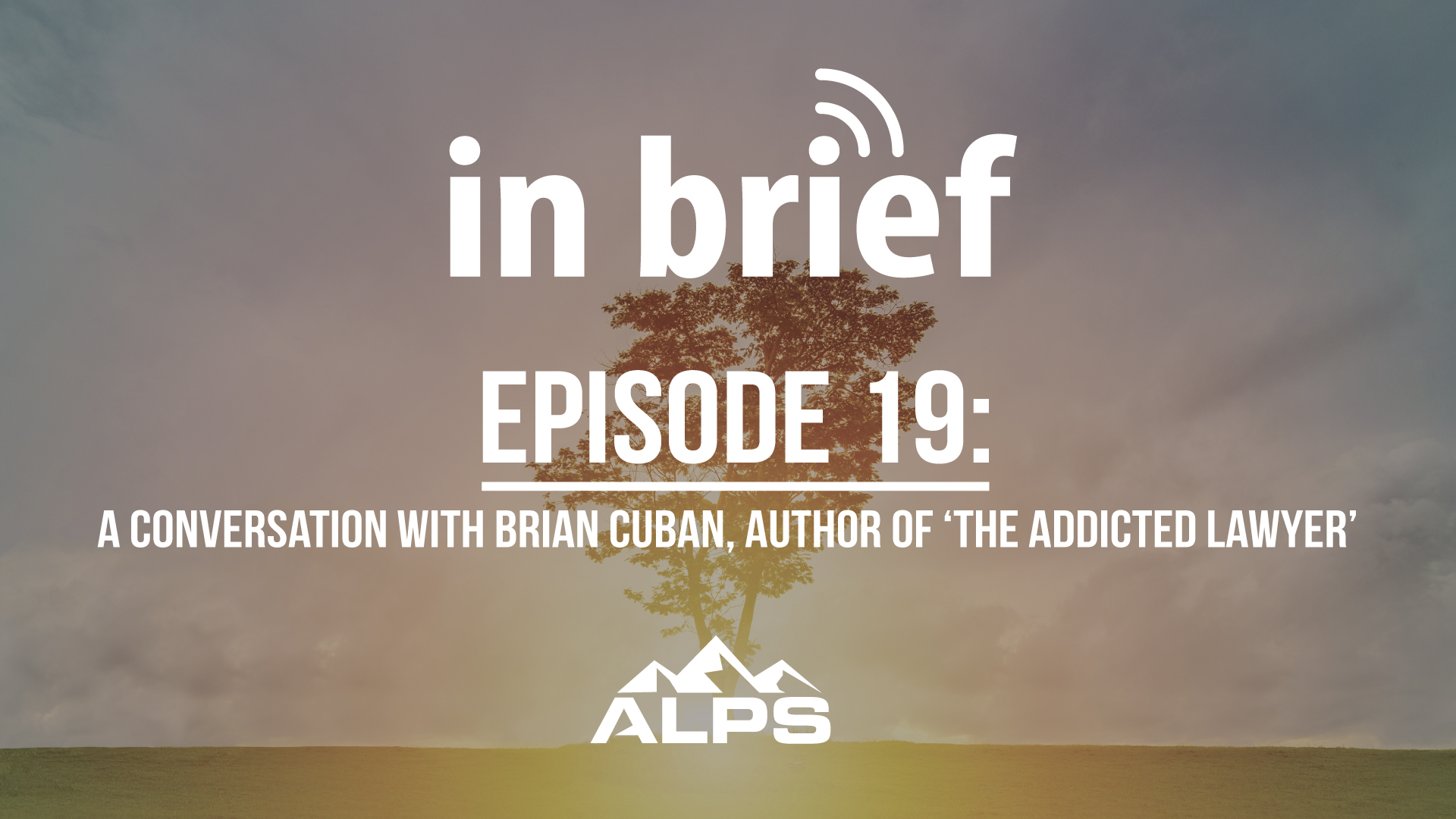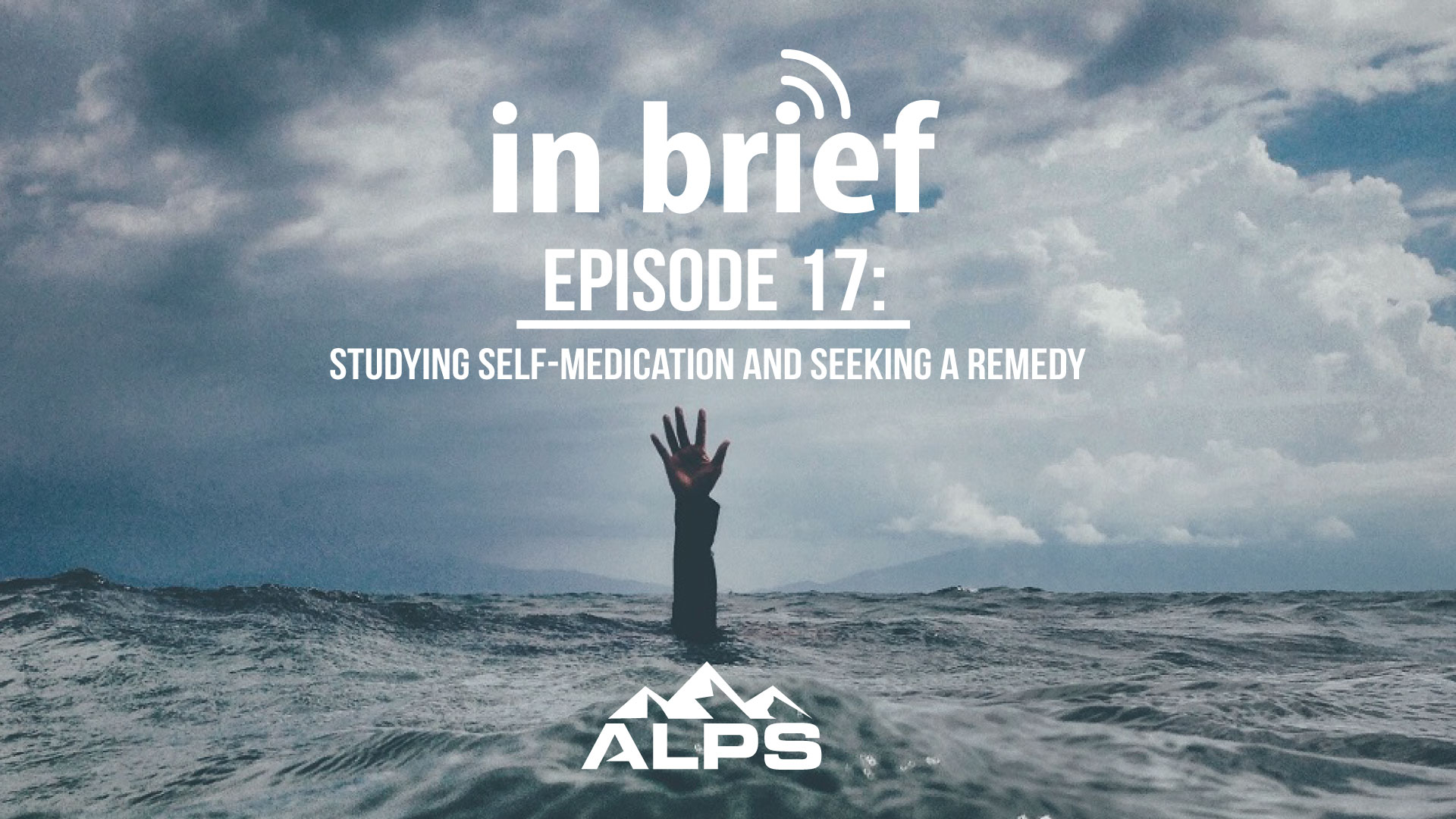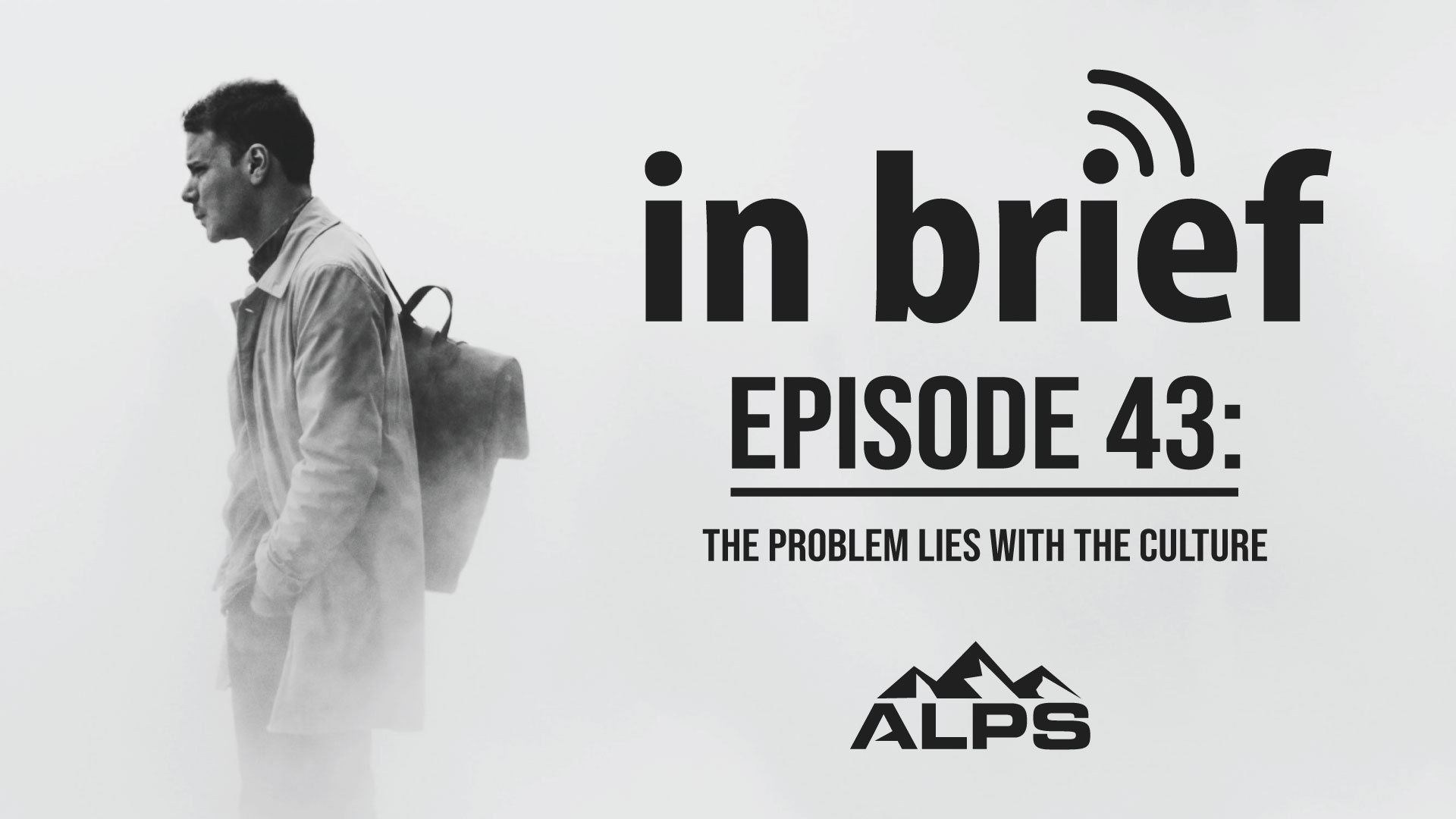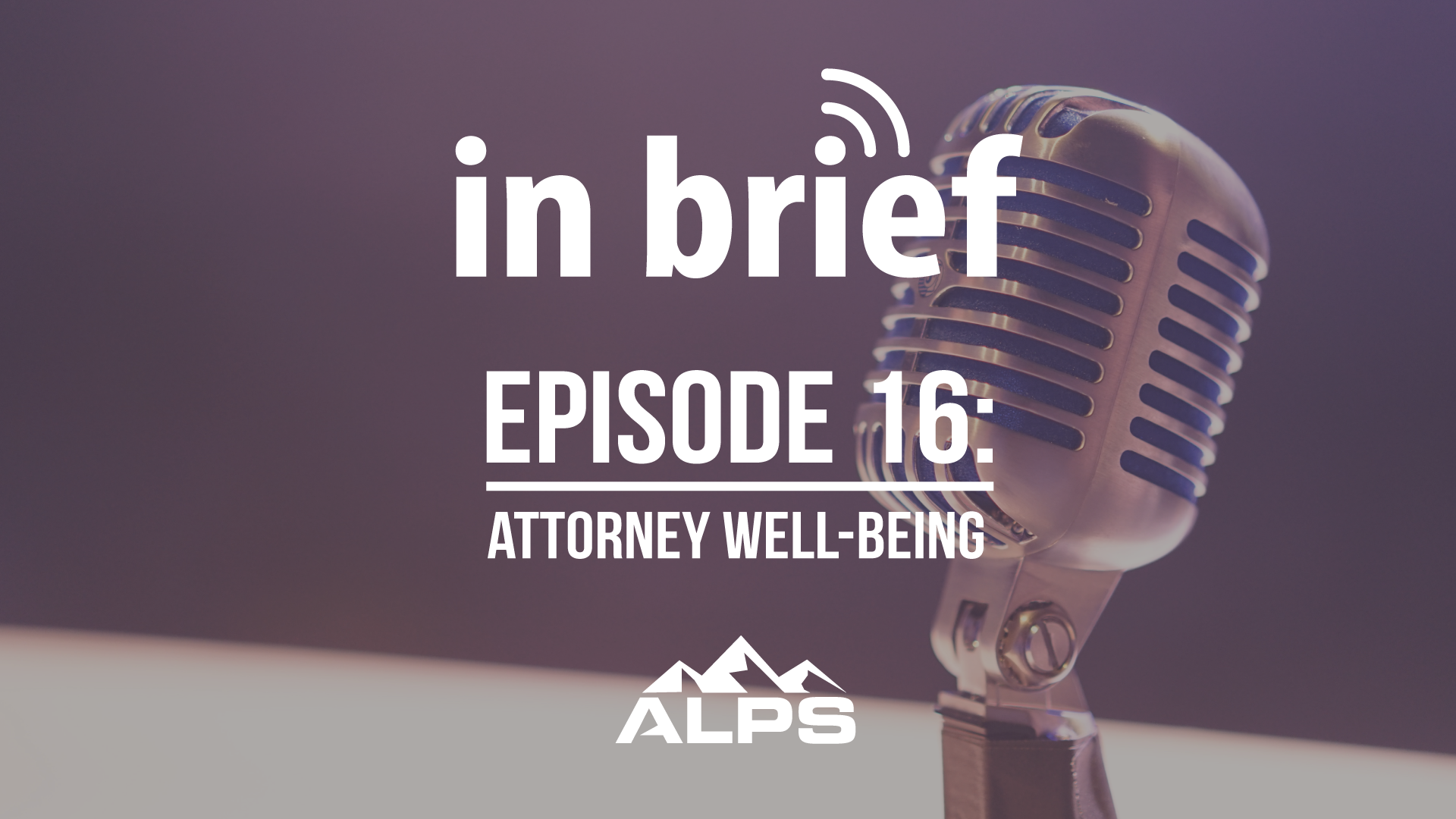14 min read
ALPS In Brief Podcast - Episode 17: Studying Self-Medication and Seeking a Remedy
Patrick R. Krill, JD, LLM shifted from the practice of law to addiction counseling at the Hazelden Betty Ford Foundation. In partnership with the...
We've crafted solutions tailored to your firm
The world of insurance for law firms can be confusing, and difficult to navigate. We've created this glossary because these common insurance terms should be easy to understand.
12 min read
 Mark Bassingthwaighte, Risk Manager
:
Updated on February 28, 2024 | Posted on August 1, 2018
Mark Bassingthwaighte, Risk Manager
:
Updated on February 28, 2024 | Posted on August 1, 2018

Addiction, substance abuse and the resulting professional and personal fallout can destroy careers and lives. As another wonderful addition to our Wellness Podcast Episodes, Mark had the opportunity to connect with Brian Cuban, Dallas-based attorney, Addiction Recovery Advocate and author of The Addicted Lawyer: Tales of the Bar, Booze, Blow, and Redemption. Brian reflects on the reasons behind addiction and his journey toward recovery. They also delve into the point where choice ends and addiction takes over. And in a profession that doesn’t necessarily champion vulnerability, Brian emphasizes the strength in laying it all out there to find that path toward healing.
If you or someone you know works in the legal profession and is struggling with addiction, please connect with your state or local bar’s Lawyer Assistance Program. The ABA offers a national directory on their site to connect legal professionals with this confidential service. To learn more about all areas of attorney wellness, visit the National Task Force on Lawyer Well-Being’s Resource Page, featuring the report and more information on what is happening in your state.
ALPS In Brief, The ALPS Risk Management Podcast, is hosted by ALPS Risk Manager, Mark Bassingthwaighte.
As a note, the sound quality on this recording is not optimal. Please don’t let that dissuade you from listening to this important conversation.
Transcript
MARK:
Hello. This is Mark Bassingthwaighte. I’m the Risk Manager here at ALPS, welcome to another episode of ALPS In Brief, the podcast that comes to you from the historic Florence building in beautiful downtown Missoula, Montana. I’m delighted to be able to introduce just a very special guest today. I’m very privileged and excited to have the opportunity to speak with Brian Cuban. Brian is, I would assume is known to some of you. He’s the younger brother of Dallas Mavericks owner and entrepreneur Mark Cuban. But more importantly, Brian is a Dallas-based attorney, author, and addiction recovery addict. He is a graduate of Penn State University and University of Pittsburgh School of Law.
MARK:
Brian, I am interested in visiting with you in no small part because of the more recent book, The Addicted Lawyer: Tales of the Bar, Booze, Blow, and Redemption. And it’s my understanding you’ve done quite a bit of speaking on this topic of addiction and recovery. Not only throughout the United States but I believe internationally, if I’m not incorrect.
BRIAN:
That is correct. And let me, one small correction.
MARK:
Yes!
BRIAN:
Addiction recovery advocate, not addict.
MARK:
Good catch! Mea culpa there, it’s a slip of the tongue. Maybe … can we briefly just start having you, for those that don’t know your story, can you share for our listeners a little bit about your story?
BRIAN:
Sure, well let’s start out with I’ve been in recovery for 11 1/2 years from alcohol, cocaine, and from an eating disorder, bulimia.
MARK:
Mm-hmm (affirmative).
BRIAN:
My drinking started in high school, it progressed through high school, and got a lot worse in law school and I discovered cocaine when I moved to Dallas – in a bathroom in a hotel in Dallas. And I became heavily addicted to cocaine and alcohol. Three failed marriages, one where I get a free set of steak knives, and they all failed related to drugs and alcohol. Two trips to a psychiatric facility and near suicide in 2005, finally finding recovery. I failed the bar exam twice, both failures relating to my being more interested in drugs and alcohol than practicing law. An interesting little anecdote from that I tell, the first time I took the bar exam, my study aids were a fifth of Jack Daniels, an 8 ball of cocaine, which is 3.5 ounces that I’d bought that same day. Needless to say I didn’t pass.
MARK:
Right, yeah. Wow. Can I…I’d love to hear, I mean this is, this is pretty heavy news. And it’s, my word, being you’ve really seen some dark places in terms of how I hear your story. When I think about others that are in various stages of addiction and dealing with challenges, I think one of the problems that people face, and please correct me if I’m wrong about this, but there’s this fear of what others will say, for instance if I’m struggling with something if I say okay I have an alcohol problem, or I have a mental illness, or I have some other type of addiction, that people are going to view me as perhaps weak, unable to cut it, you know, these kinds of things. In other words, there are social stigma’s in play. These…we fear that. I think people at times feel very shameful personally about having these kinds of struggles. May I ask how did you personally find the strength to pull out of all this, to move forward, not caring perhaps? I’m not sure of the social stigmas. But what was the strength, what enabled you to come out the other side of this?
BRIAN:
That’s a great question. And the answer’s complex, but to simplify it down, my quote-on-quote “aha” moment was standing in the parking lot of a Dallas psychiatric facility for my second time and at that moment realizing that I was probably going to lose my family if I did not find recovery. And there is really, you know there’s my wife, there’s my family and you know nothing is more important to me than family.
MARK:
Yes.
BRIAN:
And I wasn’t going to lose their love but families distance because they have nieces, I mean because they have their children, my nieces and nephews. They don’t want someone who is high on cocaine and drunk hanging around them. And so distancing occurs. And families realize whoa there’s this gray area between love enablement and recovery, where okay, where does enablement end and recovery begin. And I think that all finally it had come together and I realized that standing in that parking lot and that was the moment when I said, okay I need to take that first scary step forward and release the shame, release the stigma, ‘cause if I don’t, not only will there not be a third trip back, because I’ll probably be dead.
MARK:
Yeah.
BRIAN:
But I will lose everything that is dear to me. Why that happened in April 2007 in that moment, and not say in the summer of 2005, or when my brother came into my house and I had a weapon on my night stand, I was going to take my own life, I don’t know. That moment is different for everyone. But that is what was going through my mind at that time.
MARK:
So what I hear you saying, and I think this is a wonderful message, am I correct that you got to a point where you say ‘at some point I realized my family, that people that are in my life, are simply more important to me than getting high’. Is it that, I think it’s more complex than that, but…
BRIAN:
It’s more complex, but I can tell you that was the trigger at that moment.
MARK:
Okay.
BRIAN:
When we talked about everything that came before that you have to talk about trauma, you have to talk about childhood, a lot of bullying. You know with my relationships at home. And we have to remember that when I talk to lawyers and I talk to law students about the struggling they are facing in that moment, nothing happens in a vacuum. I’ve had lawyers and law students tell me, and I am the first person they have ever told, about bullying, about childhood trauma, about sexual abuse, about physical abuse. And I of course I am not qualified to talk to them about those issues. I have resources that I refer them to, like the Lawyers Assistance Program, they can see a counselor. But there’s a much bigger, there is a trigger in that moment, and then there is everything they thought of to that moment. Does that make sense?
MARK:
It does. Absolutely, it does. Let me kind of take this a little further in a different way. I see, you know again, in my, I’m a lawyer, I’m a tech geek, I’m not a physician, I’m not trained in drug counseling and these kinds of things.
BRIAN:
Neither am I.
MARK:
But my limited understanding of addictions is that a lot of these behaviors get their start, and then I think, become cemented because people will turn to whatever drug of choice it is as a coping mechanism. It for instance masks the pain, masks the fear, whatever it might be. And now being 11 plus years into recovery you, just like everybody else, we continue to have challenges and struggles and like these kinds of things. What have you done in terms of replacing an unhealthy coping mechanism looking at alcohol or cocaine as an example. How do you deal now? What is the healthy way? How are you coping?
BRIAN:
That’s a great question. And lets deal with a current real life example. I am not disclosing this to make people feel sad but its – life and death is real. My father died 2 weeks ago today, at 92 years old and we were very, very close. I was just at the cemetery visiting him before this podcast. That is trauma right?
MARK:
Yes it is.
BRIAN:
That is something that 12 years ago I absolutely would have turned to the cocaine. Gone out and gotten hammered. Done who knows what in order to mask that pain. But I learned that doing that to mask that pain, one, is not going to bring my father back.
MARK:
Yes.
BRIAN:
Two, was going to set me on a path that he wouldn’t want. That my family wouldn’t want. And that would end up with me back at that psychiatric facility or dead. So I had to learn to deal with trauma on life’s own terms. Whether that is the passing of a loved one. Whether that is the passing…whether that is the bullying of my childhood. Whether that is any type of thing that we try to mask. Right, you go into a high school and you talk to students who were smoking weed or all kinds of polymorphic drug use. And you ask them why, they may not be able to articulate it that they are masking. Masking pain, they’re masking rejection, they’re masking the need to be accepted. So that starts in high school and this need to use a substance to mask goes on to law school, to college, through college, to our law practice. So what did I learn in that moment in 2007, well I learned that I needed support. To support, my first support was 12-step.
MARK:
Okay.
BRIAN:
I am not promoting 12-step. I am not saying that is the way for everyone. But it wasn’t even a way that I particularly wanted to embrace. But I knew I had to take some step, and I needed support, and I needed to be able to be with people who understood exactly what I was going through. So I walked into that alcohol based 12 step and Alcoholics Anonymous is the most well-known of those.
MARK:
Yes.
BRIAN:
And that was April 8, 2007. And so 12-step has been one of my ways, and the first thing I did, other than relying on the love of my family when my father passed, I went to a 12-step meeting. That is how I cope. And I’m hopeful in counseling. I have been seeing a psychiatrist for 15 years.
MARK:
I find this a very positive message of hope. What I hear you saying is, or how I’m responding to what your saying is, as an addict you make this choice to fall back on something that numbs, that masks, that hides the pain and all these kinds of things. But now you’ve realized, and you’ve identified the same problems that might send you there but you realize that you have choices. And you have people that can be supportive because no one is expected to go through, and should have to go through all kinds of…you’re not alone in other words. And I think the world of addiction for, again what I hear and understand, is this loneliness thing is very central and is in part something that drives the poor decision making. You’ve come out this other side and, and, support … I love the message.
BRIAN:
I also want to be careful about how we frame choice.
MARK:
Yes okay. Please.
BRIAN:
There’s this saying that addiction, and I believe in the disease model, some people don’t, I do.
MARK:
I do too.
BRIAN:
Addiction is not a choice, but recovery is. Recovery is about choices. Okay.
MARK:
Yes.
BRIAN:
And people get kinda caught up on this and it is a very kind of volatile issue. If you asked me, was the first time I did a line of cocaine a choice? Of course it was a choice. I chose to do it. Now was it choice influenced by a lot of childhood trauma and a lot of self loathing issues, a lot of issues on how I viewed myself? But it was a choice. But when I did that line of cocaine and suddenly for the first time in my life, for 15 seconds, looked in the mirror and finally loved myself.
MARK:
Yeah.
BRIAN:
The process that took over in my brain told me I need to do that again and again and again to continue to love myself was not a choice.
MARK:
Yes.
BRIAN:
That is the difference. I want to be sure we frame choice properly.
MARK:
And I appreciate, and I absolutely agree with you and understand. I think that’s a very important point to make.
Can we sort of assume for a moment that somebody is listening to this podcast that may have some level of addiction, some struggle, and is sort of responding to this ‘well this is kind of interesting but it doesn’t apply to me, I don’t really have a problem, counselors are for…they’re all trying to fix themselves you know, they don’t know what they’re doing, they’re just head games’? You see where I’m trying to go. That there’s all kinds of excuses not to try to acknowledge that we have a problem. And people can get, for the lack of a better term, stuck. And at times stuck for years. And that’s where I presume some distancing comes into play and all kinds of things. What would you say to this individual?
BRIAN:
I think for the most part the odds of it going away are more slim, that it’s only going to get worse, this is proven out. Okay. Addiction is a progressive disease. That it is okay to reach out to someone to seek help.
MARK:
Okay.
BRIAN:
I would encourage that person to take a real-life stock of what’s going on in their life, day-to-day life. How is your relationship with your wife? How is your relationship with your children? How is your relationship with your partner at the law firm, or your friend? What is actually going on in your life? Where does it stand? Because there is no such thing as high function. Because there is no such thing as high functioning, okay. There is only a degree of decline of functioning. And the biggest issue I see in the legal profession because we don’t like to be vulnerable, is waiting for the consequences to catch up to the problem.
Are you going to take stock of it now? And at least take one step forward to make your life just a little bit better. However you define that outside of drugs and alcohol. Whether it’s your wife. Whether it’s your children. Whether it’s what’s doing on at work. Are you going to do that or are you going to wait for the consequences to eventually catch up to what’s going on as it gets progressively worse. And that will happen. And all of the sudden it’s worse. All of the sudden its malpractice. All of the sudden it’s a bar complaint. All of the sudden you’re facing suspension, disbarment. All of the sudden you are unemployed. Why wait for that? Take that first step now. Call your Lawyers Assistance Program. It’s confidential.
MARK:
Yes, yes. And I really appreciate your sharing that idea. I think so many people are a little bit afraid of talking to these various Lawyer Assistance Programs because there is this fear that there’s gonna be some…its gonna get out. These are confidential situations in terms of communications and what not. And my experience in terms of the people that are involved in running these programs are just down to earth, rock solid, good people that had been there.
BRIAN:
And you know what, no matter how much I say it, there’s gonna be a demographic of lawyers who aren’t going to be using them, cause they are just convinced in their mind. We don’t have enough time but I have a funny anecdote about that, they’re just convinced in their mind that they are an arm of the state bar, they are not confidential and that is going to get out.
Let me tell you what is not confidential is when you wait for the consequences to catch up to the problem and that’s your name in the back pages of your bar journal.
MARK:
You are so right and I love that. But that’s the reality. That’s what’s coming if this isn’t addressed. You’re absolutely correct. You’re absolutely correct. Well listen Brian I really appreciate your taking the time today to share a bit of your story and to spend a little time here with me on the podcast, it really has been a pleasure. I hope at some point to have another opportunity. You’re the kind of guy I’d love to just sit down and enjoy a nice glass of Italian sparkling water or something, and just have a nice meal and some great conversation. That would be just wonderful.
BRIAN:
Let me end with one more thing.
MARK:
Yes please.
BRIAN:
A lawyer or even a law student who is listening to this who is struggling out there but thinks they’re coping, ‘I’m coping, I’m doing okay’. Ask your wife if you’re doing okay. Ask your children if you’re doing okay. Ask your partner if you’re doing okay. Ask your…ask an associate if you’re doing okay. Ask a friend of yours if you’re doing okay. You will get a different answer than you think.
MARK:
Yeah, yeah. And then have the courage to listen.
BRIAN:
And have the courage to listen. You have to be able to drop that wall and be ready for the response. Because dropping the wall won’t…allowing yourself to be vulnerable is one of the hardest things we can do in the legal profession. Because we’re used to…we’re trained to take advantage of that, right, in our profession?
MARK:
That’s right.
BRIAN:
It’s not something we allow ourselves to do. To self-explore.
MARK:
Yeah, yeah. I appreciate that, that’s solid, solid advice. Well we are out of time here. I do want to say to all of you listening in I hope you found something of value in today’s conversation. Please feel free to reach out any time if any of you listeners have any thoughts in terms of topics or other folks that you’d like to listen to, in terms of have them join us on the podcast. Thanks for listening and have a good one. Bye bye.
Brian Cuban, the younger brother of Dallas Mavericks owner and entrepreneur Mark Cuban, is a Dallas based attorney, author and addiction recovery advocate. He is graduate of Penn State University and The University of Pittsburgh School of Law. Brian has been in long term recovery from alcohol, cocaine and bulimia since April of 2007.
His first book, Shattered Image: My Triumph Over Body Dysmorphic Disorder,” chronicles his first-hand experiences living with, and recovering from, twenty-seven years of eating disorders, and Body Dysmorphic Disorder (BDD).
Brian’s most recent, best-selling book, The Addicted Lawyer, Tales of The Bar, Booze, Blow, & Redemption is an un-flinching look back at how addiction and other mental health issues destroyed his career as a once successful lawyer and how he and others in the profession redefined their lives in recovery and found redemption.
Brian has spoken at colleges, universities, conferences, non-profit and legal events across the United States and in Canada. Brian has appeared on prestigious talks shows such as the Katie Couric Show as well as numerous media outlets around the country. He also writes extensively on these subjects. His columns have appeared and he has been quoted on these topics on CNN.com, Foxnews.com, The Huffington Post, Above The Law, The New York Times, and in online and print newspapers around the world. Learn more at www.briancuban.com.
ALPS In Brief Podcast Intro/Outro Music: Walk In The Park by Audionautix is licensed under a Creative Commons Attribution 4.0 license. https://creativecommons.org/licenses/by/4.0/
Artist: http://audionautix.com/
Mark Bassingthwaighte, Esq., serves as Risk Manager at ALPS, a leading provider of insurance and risk management solutions for law firms. Since joining ALPS in 1998, Mark has worked with more than 1200 law firms nationwide, helping attorneys identify vulnerabilities, strengthen firm operations, and reduce professional liability risks. He has presented over 700 continuing legal education (CLE) seminars across the United States and written extensively on the topics of risk management, legal ethics, and cyber security. A trusted voice in the legal community, Mark is a member of the State Bar of Montana and the American Bar Association and holds a J.D. from Drake University Law School. His mission is to help attorneys build safer, more resilient practices in a rapidly evolving legal environment.

14 min read
Patrick R. Krill, JD, LLM shifted from the practice of law to addiction counseling at the Hazelden Betty Ford Foundation. In partnership with the...

7 min read
ALPS Risk Manager Mark Bassingthwaighte shares two real-world stories of attorneys struggling with behaviors that often lead to malpractice claims....

10 min read
Mark Bassingthwaighte sat down with ALPS’ Executive Vice President Chris Newbold earlier this year to discuss the topic of Attorney well-being....